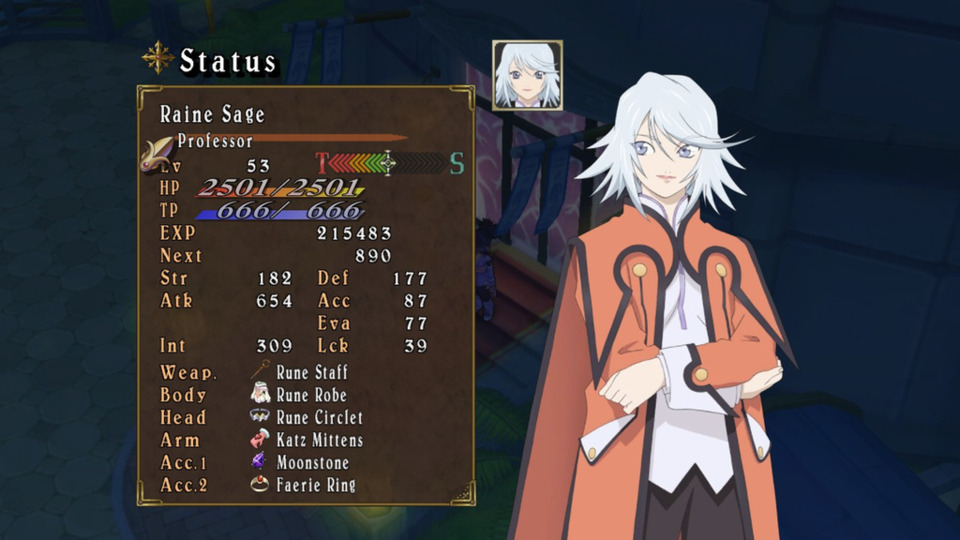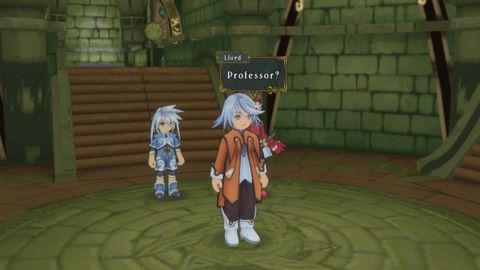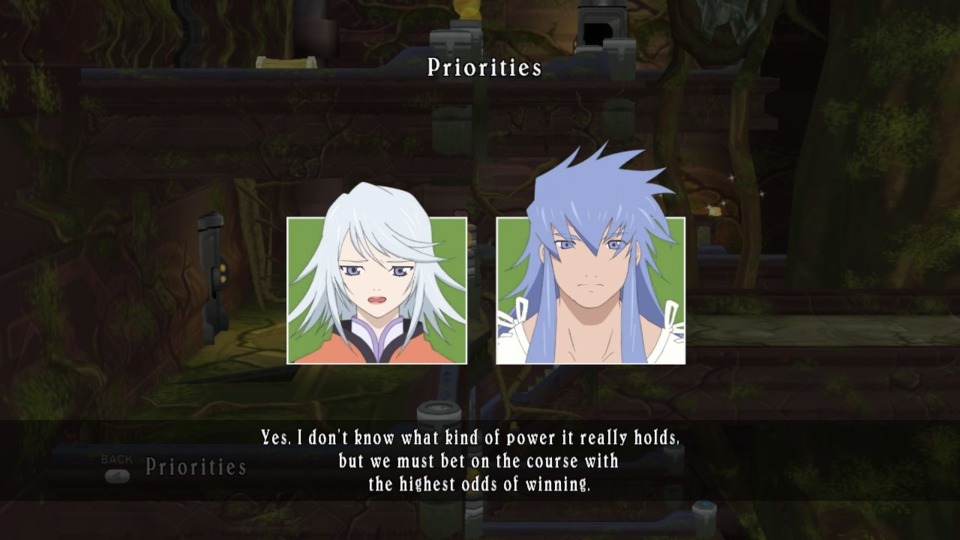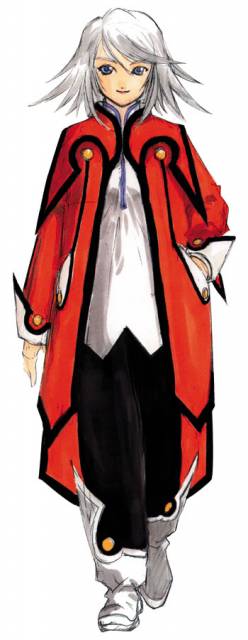Everything About Tales of Symphonia - Part II: The Worries And Wisdom of Raine Sage
By generic_username 3 Comments


Consider this a follow up to my piece about Lloyd Irving, the protagonist of Tales of Symphonia. For those of you who don't want to read that and get caught up, here's the context you'll need: I love Tales of Symphonia, and recently played it again to see if my love for it was based on nostalgia or if the game is as good as I remember. I actively played the game with a more critical eye, and as a result, was able to form a more concrete opinion about why I like it so much. It was as good as I remembered, apparent flaws and all, and it also had a little more going on with its characters than I remember. Last time, I focused on Lloyd's development and how I felt that it closely resembled my own. This time, I want to look at my second-favorite (the first isn't Lloyd, by the way) character from the game, the archeology-obsessed Professor Raine.

Raine Sage is, at least early on, the "adult" of the group, content to let the younger members philosophize and exhaust themselves while she and Kratos discuss the less-thought-provoking logistical aspects of the journey. In the early parts of the game, the two play a similar role, though Kratos is far more distant and aloof than Raine is. Raine has quirks and faults of her own that immediately bring her down to earth, while Kratos keeps his distance, the mystery surrounding his motivations and intentions defining the group's interactions with him more than any particular aspect of his personality. Raine, however, has moments that make everyone in the group roll their eyes from time to time, especially when in the presence of historically significant ancient artifacts or ruins.
When she encounters one of these ruins, her eyes light up, and she starts passionately explaining their importance, slowing the group's progress as she prattles on and on. She talks about ruins the way I talk about this game: she raves about the subject, and has way more to say about it than most people care to hear. Obviously it's over-the-top here and done for comedic effect, but I did find a way to appreciate this aspect of her character in spite of it being little more than a goofy eccentricity.

Raine is the older sister of smartass Genis, Lloyd's best friend throughout the game. Genis is always there to defend Lloyd when it counts, even if he teases him and makes fun of his occasional stupidity. He's incredibly smart, and as such is used to being able to say whatever he's thinking, sure it will sail over most people's heads even if it's rude. Raine, however, is both smarter and more mature than her younger brother, and acts as a parental figure to him (and with the rest of the party.) She chastises him when he mouths off, even resorting to physical punishment at times. In fact, the speed at which she rises to violence when she gets angry is often alarming to the rest of the group, and they walk on pins and needles around her if they're worried she's in a bad mood. This is almost exclusively played for comedy, though.
Lloyd is an idealist who doesn't want to hurt anyone, but Raine is pragmatic to a fault. She sees the best course of action in any given situation, and is often frustrated by how emotionally-driven the younger members of the party usually are. They're a lot like Lloyd: they hate to see people suffering in front of them, and will go out of their way to assist someone in need. This often puts the mission - the vitally important "Journey of Regeneration" - on the back-burner, which Raine is remiss to do, surmising that when the world is restored, many of these problems will solve themselves.

She's not heartless, though. In fact, her pragmatism is sometimes at odds with her actual emotional wants and needs. She hates to see or cause suffering, but she values logic and reason very highly, tending to prioritize success and efficiency over her personal desires. While her pragmatism initially comes off as cold and uncaring, it's quickly shown that she cares deeply for the other members of the party, and would never suggest a plan that would cause them unnecessary suffering, even if it were the most "sensible" solution available to them. She has been with Genis, Lloyd, and Colette for a long time. She's watched over them for years, and continues to as they start heading into the future, catching them when they stumble on the way there. They're family to her, literally in Genis's case, but she cares for the other two just as much as she does her brother.
Raine is a fountain of wisdom, though not in the sense that the "wise old man" character archetype tends to be. Rather than spout off proverbs and one-liners all the time, Raine is always helping the younger members of the group see things from different perspectives.
When Lloyd angrily shouts about his hatred of the Desians, Raine asks him what brought it on. He recounts his promise to never allow the Desians to do what they did to his hometown again, frustrated by the fact that they keep committing atrocities and he hasn't been able to stop them. He hates seeing the port city Palmacosta threatened by the Desians, and is understandably angry about the cruel way they operate. Kratos chastises him for losing his cool, telling him that that's the sort of behavior that leads to mistakes like the one he made at his hometown. Lloyd, still pissed off, yells at Kratos, telling him to shut up. Raine easily finds the words to bring Lloyd back to his senses.
"Lloyd, your feelings are always honest and pure. Nevertheless, that's not a reason to ignore the advice of your comrades. We are worried about Palmacosta, but we're also worried about you, understand?"
Lloyd apologizes to both her and Kratos, and the potentially relationship-damaging situation is effectively diffused. Another situation finds Kratos privately complaining to Raine that the two of them are the only ones up to the task of protecting Collette and saving the world. She takes offense at his portrayal of the rest of the group, saying, "I'm still just a school teacher from a small village. And you're a mercenary who fights for money. I don't think we're fit to handle the task of saving the world, either, wouldn't you agree?" This puts Raine in a pretty great light, showing that she's as humble as she is eloquent. She dislikes it when people think of themselves as better than others. This little exchange is important setup for the game's eventual narrative shift, which I'll cover another time.
"I don't think we're fit to handle the task of saving the world, either, wouldn't you agree?"
Even though Raine starts the story as someone who already kind of has herself figured out, she grows over the course of the game, too. [spoilers ahead!] She ended up taking care of her brother Genis because her mother abandoned them when they were young. Raine remembers this, even though Genis doesn't, and doesn't really talk about it very much. This is revealed to be the reason for her obsession with ruins; her mother left the siblings at one when she abandoned them, and Raine studied her entire life in a desperate attempt to find the ruin she remembered from her childhood. As it turns out, the ruin was located in another world, known there for a curse that spirits people away. It lives up to its reputation, whisking Raine and Genis away to the world where they grew up, and it left Raine with a head full of memories of places she could never return to.
She resents her mother for this. When the group is able to travel to this other world, Raine eventually encounters her mother, and she seems to have lost touch with reality. She is holed up in a small house, cradling a doll, treating it is if it were a real child. Raine is disgusted by this, appalled that her mother was caring for a child's toy when she refused to care for Raine and Genis. Her logical mind fails her in this one aspect; she blinds herself to the possibility that her mother's mental instability was not a choice, finding it easier to simply be angry at her than to forgive her. She overcomes this obstacle somewhat over the rest of the game, though it's never explicitly stated that she forgives her. Her issues with abandonment never entirely go away.

Raine struggles to overcome her resentment towards her mother, but she improves herself in other ways throughout the game. [spoilers end] Raine is always giving thoughtful advice, but often ends up saying something she needed to hear just as much as everyone else did. Sometimes this leads to her feeling conflicted or depressed, frustrated at her own hypocrisy, but there are just as many times it helps her feel better, too. Sometimes you just have to hear yourself say something out loud before you really believe it.
Her growth comes from the growth of the other characters. She does everything she can to help Lloyd grow into a better person, and as she sees it happening, many of the changes he goes through rub off on her, too. She is still too logical to honestly believe in Lloyd's ideals, but she is able to believe in Lloyd himself, and therefore find hope for the future that way.
"Your way of thinking is not wrong. But you must deal with the frustration of the fact that sometimes you are forced to make a choice. Lloyd, take responsibility for the choices you have made.
...The reason I say such harsh things is that I believe that you will overcome them. You are strong, Lloyd."

This is how you write that style of character arc. Characters who are defined by their relationships with other characters tend to range from shallow to downright offensive when done poorly. Sometimes it seems like it's out of laziness, but usually it's born from some misguided need to make the protagonist, and by extension the player, seem more important. Raine's arc is tied to other characters because she feels responsible for their safety and emotional well-being. It's believable, and it gives her agency too, something painfully lacking from characters who spend their entire arcs in the shadow of the protagonist.
Raine is one of my favorite characters in Tales of Symphonia. She sidesteps the traps that other characters like her often fall into, and is generally more nuanced and believable as a person than similar characters tend to be. She is more than the "wise old sage" of the party because she is actually deeply flawed herself, often perfectly aware of her own hypocrisy when giving advice. She manages to have a character arc that isn't really about her own story, but it feels appropriate to her character, and doesn't come off as a result of lazy writing the way this kind of character often does. Raine admittedly still embodies several common character tropes in a very direct way, but for the most part she's written well enough to overcome the worst aspects of them. Raine Sage leaves an impression, and manages to be one of the standout players in Tales of Symphonia's already memorable cast.
